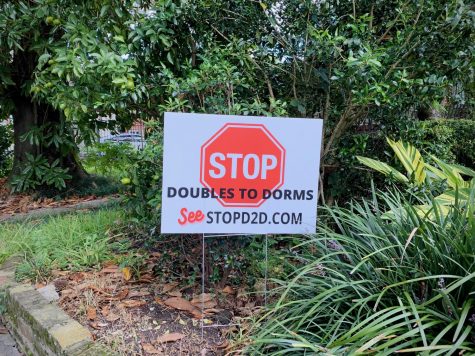City Council combats congestion, development Uptown
October 20, 2021
After years of contentious debate between Uptown residents and property developers, the New Orleans City Council instituted new barriers against “doubles to dorms” developments.

The new rule, approved Oct. 7, imposes stricter regulations on developers. Any new or refurbished properties with more than four bedrooms will be required to have an off-street parking spot for each of the bedrooms in the development.
The developments can have at most two-and-a-half bathrooms. The rules also require parking spots be built of materials that can absorb rainwater.
Not all properties will be affected by the Council’s decision. Affordable housing developments are not included and neither are properties in commercial areas or with homestead exemptions.
City Planners first reviewed the issue last year when residents complained about developers taking advantage of the neighborhood housing markets by renovating homes and renting them out to college students at a high cost.
“We needed something to be done,” councilmember Joe Giarrusso said.
Tulane University students help drive this market. Juniors, seniors and graduate students typically live off campus.
Neighbors mainly have issues with developers who buy homes traditionally used by renters or families, then completely change their structures into multi-bedroom miniature dormitories.
“That’s not what these neighborhoods are for,” Giarrusso said.
Such developments have three main consequences, according to Giarrusso. Once converted, homes cannot be used for other purposes. Rents go up as a result. If homes are purchased for more than market value, taxes also rise, forcing some residents to move away.
“When you have universities that are right near residential areas, it’s always going to be a delicate ecosystem,” Giarrusso said.
Multi-bedroom developments also create congestion because there are often not enough parking spaces for so many renters under one roof.
Peter Ricchiuti, a Tulane business professor and 25-year resident of the area, said the “doubles to dorms” initiative has made parking increasingly difficult.
“Anyone driving around this neighborhood will reach the same conclusion,” Ricchiuti said.
After months of studying the issue, the City Planning Commission argued the parking rules would raise the cost of housing. Other detractors say the rules will discourage affordable housing at a time when access to it is a rising problem in urban neighborhoods.
State Representative Aimee Freeman, a Tulane adjunct professor and graduate, said she hopes the new ordinance will keep the neighborhood accessible to both students and longtime residents.
“A critical piece of keeping our neighborhood livable and affordable is stopping over developments,” Freeman said.
Development barriers, combined with Hurricane Ida repairs and supply chain delays, could temporarily decrease available rentals in nearby neighborhoods. Students should understand this information when looking for off-campus housing, said Lauren Jardell, Tulane director of Local Government and Community Relations.
Giarrusso said he has not heard concerns from Tulane about housing availability.
The Council approved the motion unanimously. Members will later approve a formalized ordinance of the rules.






















Leave a Comment